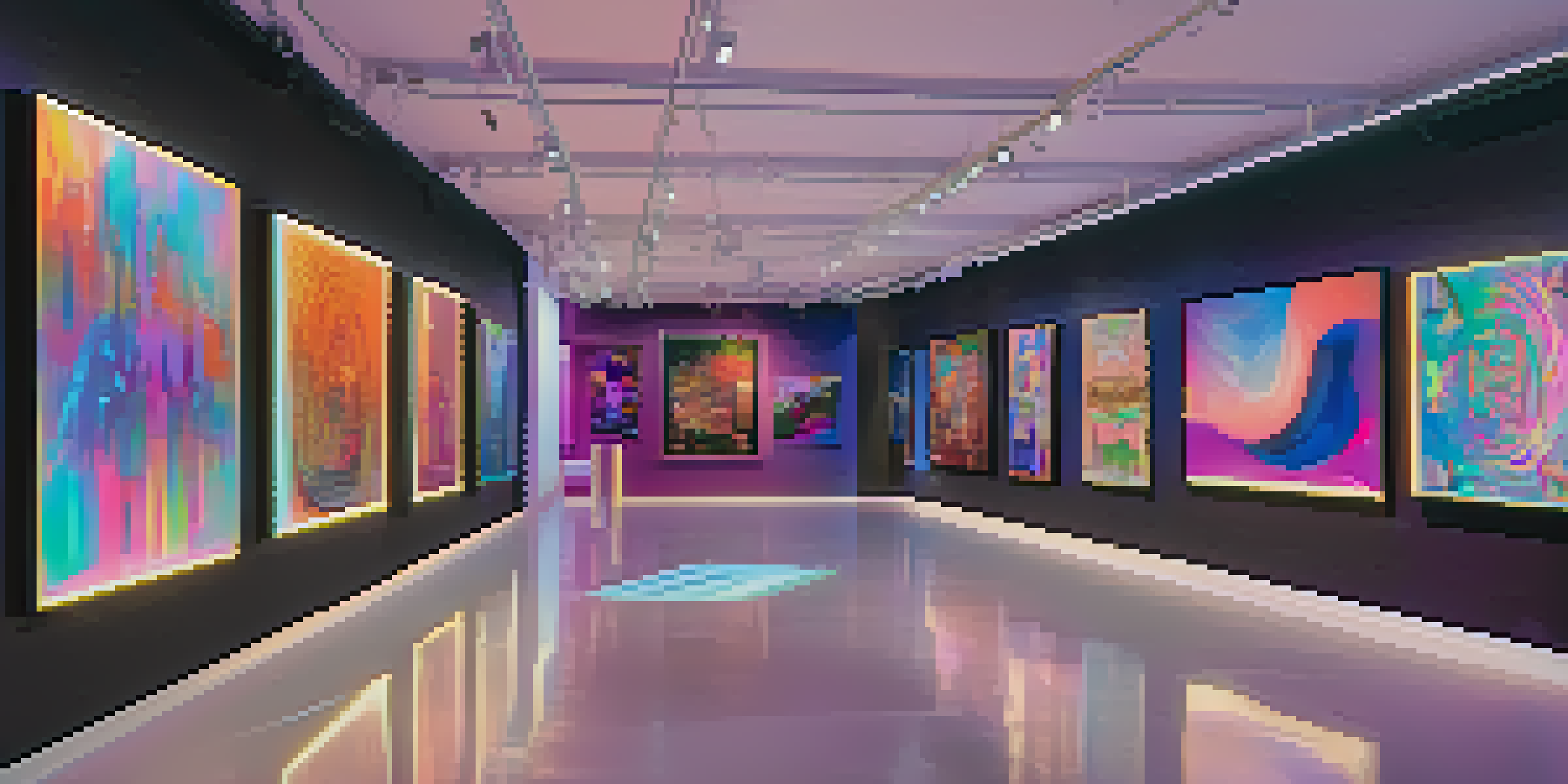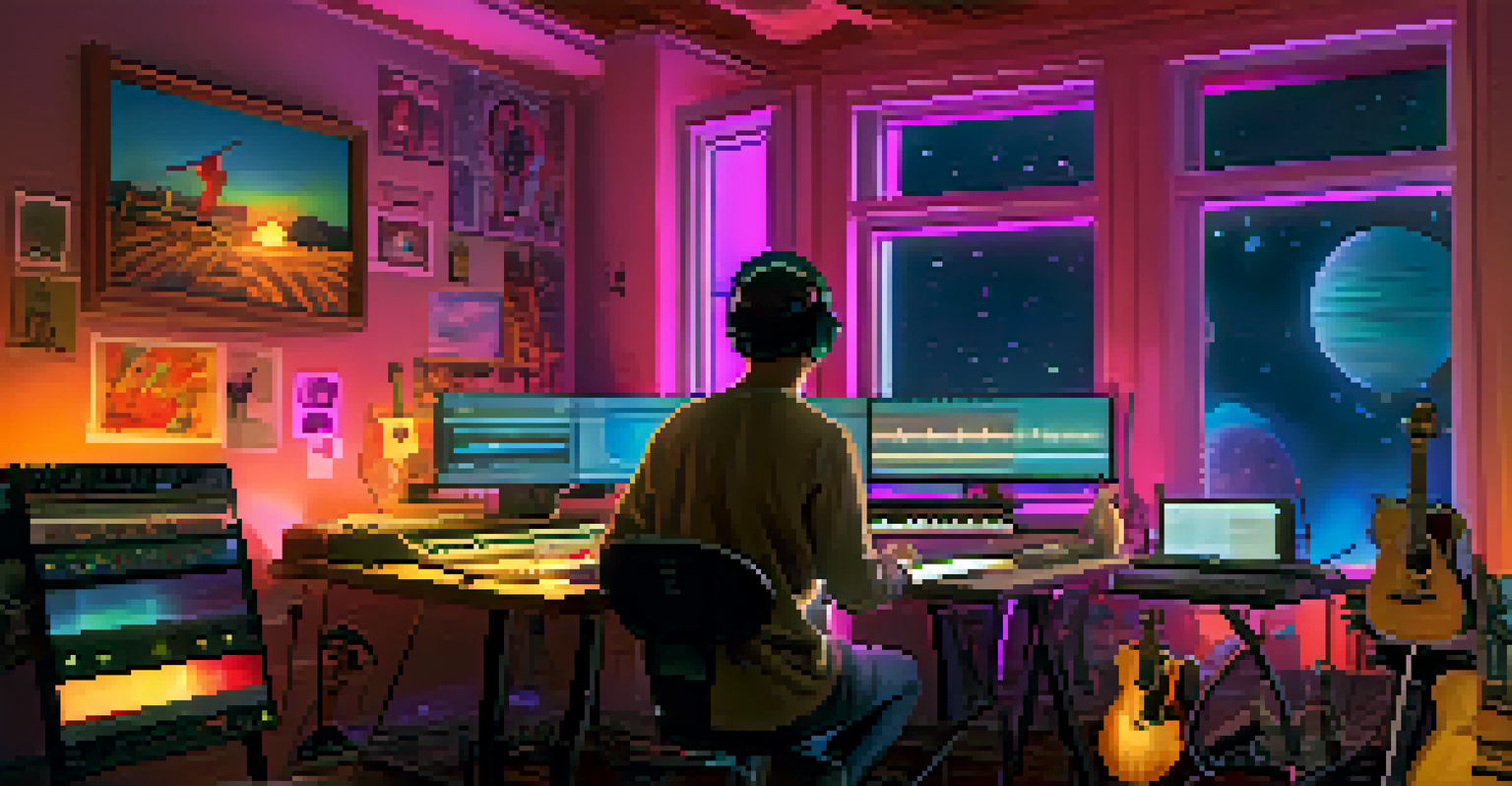Exploring NFTs in Music: Revolutionizing Artist Revenue Streams

Understanding NFTs: The Basics You Need to Know
NFTs, or non-fungible tokens, are unique digital assets verified using blockchain technology. Unlike cryptocurrencies, which are interchangeable, NFTs represent ownership of specific items, such as music tracks, artwork, or even concert tickets. This uniqueness is what makes them particularly appealing to artists looking to monetize their work.
The future of music is going to be about connecting with fans in ways we’ve never thought possible, and NFTs offer us a glimpse into that future.
In the music industry, an NFT could represent a song, an album, or even exclusive content like behind-the-scenes footage. When an artist issues an NFT, they create a direct connection with fans, allowing them to own a piece of the artist's work. This shift from traditional ownership models opens up new possibilities for revenue generation.
As musicians and labels begin to understand the potential of NFTs, we're seeing an emerging market where creativity meets technology. This new landscape is not just about selling music; it's about enhancing fan engagement and creating value in ways that were previously unimaginable.
How NFTs Create New Revenue Streams for Artists
NFTs allow artists to earn revenue in ways traditional models don't support. For instance, musicians can sell limited edition tracks directly to fans, often at a higher price point than streaming services offer. This direct sale model empowers artists to capture more of their work's value, which is crucial in an industry often dominated by record labels.

Additionally, NFTs can include smart contracts, which automatically pay artists a percentage every time the NFT is resold. This means that as an artist's work gains value over time, they can continue to benefit financially. It’s a game-changer for long-term revenue, allowing artists to partake in the ongoing success of their creations.
NFTs Redefine Artist Revenue Streams
NFTs empower artists to sell unique digital assets directly to fans, allowing for greater financial control and engagement.
Moreover, the fan experience is enhanced as they gain exclusive access to events, merchandise, or even private concerts tied to their NFT ownership. This creates a sense of community and investment in the artist's journey, which is a win-win for both parties.
The Role of Fan Engagement in NFT Adoption
Fan engagement is at the heart of the NFT movement in music. Artists who leverage NFTs often find that their fans are not just passive listeners; they become active participants in the artist's career. This relationship can lead to stronger loyalty and a more dedicated fan base, which is vital in today's competitive music landscape.
NFTs empower artists to take control of their art and revenue, creating a more equitable landscape for everyone involved.
By offering unique experiences or content through NFTs, artists can foster a deeper connection with their audience. For example, an artist might offer an NFT that grants fans access to exclusive album previews or a chance to collaborate on a song. These opportunities make fans feel valued and appreciated, encouraging them to invest in the artist's work.
As more artists embrace this model, the music industry is likely to witness a shift in how fans perceive their role. Rather than just consumers, they become co-creators and supporters, which can drive further innovation in how music is produced and shared.
Challenges Artists Face with NFTs in Music
While NFTs present exciting opportunities, they also come with challenges that artists must navigate. One significant hurdle is the technical knowledge required to create and sell NFTs. Many artists may not be familiar with blockchain technology, which can create a barrier to entry for those looking to enter the NFT space.
Additionally, the environmental impact of blockchain technology raises concerns. The energy consumption associated with creating and trading NFTs has led some artists to hesitate. As discussions around sustainability in the music industry continue, artists must weigh the benefits of NFTs against their environmental footprint.
Fan Engagement Drives NFT Success
By offering exclusive experiences through NFTs, artists foster deeper connections with fans, turning them into active supporters.
Finally, there’s the issue of market volatility. The NFT market can be unpredictable, with values fluctuating significantly over short periods. Artists must approach this new revenue stream with caution, ensuring they have a solid understanding of the market dynamics before diving in.
Successful Case Studies: Artists Thriving with NFTs
Several artists have successfully embraced NFTs, showcasing the potential for innovation in the music industry. For instance, musician Grimes sold a collection of NFTs that generated nearly $6 million, highlighting how digital art and music can create significant revenue. This success story illustrates the financial potential for artists willing to explore new avenues.
Another notable example is Kings of Leon, who released their album as an NFT, offering exclusive perks like front-row concert tickets and special vinyl editions. This approach not only generated income but also deepened fan engagement, demonstrating how NFTs can enhance the overall experience for listeners.
These success stories serve as inspiration for other artists considering NFTs. By studying what works and understanding the strategies employed by their peers, musicians can carve out their unique path in this evolving landscape.
The Future of NFTs in the Music Industry
As the music industry continues to evolve, NFTs are poised to play a crucial role in shaping its future. With the growing acceptance of digital assets, we can expect more artists to explore NFTs as a viable revenue stream. This shift could lead to a reimagined music economy where artists have greater control over their work and revenue.
The integration of NFTs may also prompt record labels to adapt their business models. If artists can generate substantial income through direct sales and fan engagement, traditional labels may need to rethink their roles and how they support artists in this new landscape. This evolution could lead to a more equitable industry for musicians.
Challenges of NFTs for Artists
Despite the opportunities, artists face hurdles like technical barriers, environmental concerns, and market volatility in the NFT space.
Ultimately, the future of NFTs in music will depend on how well artists and fans navigate this uncharted territory. As technology and creativity collide, the possibilities are endless, and we are only beginning to scratch the surface of what NFTs can achieve.
Final Thoughts: Embracing Change in the Music Industry
The emergence of NFTs in the music industry represents a significant shift in how artists can monetize their work. By embracing this change, musicians have the opportunity to redefine their revenue streams and enhance their connection with fans. It's an exciting time for creativity and innovation, and artists who adapt may find themselves at the forefront of this revolution.
While challenges exist, the potential rewards make exploring NFTs worthwhile. By understanding the technology and market dynamics, artists can position themselves to thrive in this evolving landscape. The key is to remain open-minded and willing to experiment with new ideas.

As we look to the future, it’s clear that NFTs are more than just a trend; they are a glimpse into the future of music. By embracing this new frontier, artists can not only secure their financial future but also create a more engaged and invested fanbase.